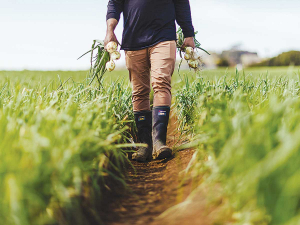Horticulture exports hit a record breaking $6.2 billion in the year ending June 2019 – up $720 million over the previous year.
The sector accounted for more than 10% of New Zealand’s total merchandise export income.
According to the latest edition of Fresh Facts, published annually by Plant & Food Research and Horticulture New Zealand, the total New Zealand horticulture industry was valued at $9.5 billion in 2019.
A significant $3.4 billion of this was fresh fruit exports, which grew by $54 million since 2018. Kiwifruit continues to be New Zealand’s largest fresh fruit export, valued at $2.3 billion in 2019.
A whopping 545,800 tonnes of kiwifruit exports were sent overseas, two thirds of this to Asian countries. Apples were the second largest fresh fruit export, earning $829 million. New Zealand-bred varieties such as Jazz, Envy and Pacific brand apples are popular with overseas consumers and made up a quarter of apple exports.
Wine exports to 100 countries in 2019 earned more than $1.8 billion. The US, UK, Australia and Canada were the main markets – more than 80% of wine exports went to these countries.
Notable vegetable exports include onions, which had a $170.3 million export value in 2019, more than half supplied to European markets.
Some $129.4 million of potatoes were exported, mostly in processed form for the Australian market. Potatoes remain a New Zealand favourite too, with Kiwi consumers spending the most on them out of all vegetables purchased.
New Zealand horticultural produce was exported to 130 countries in 2019.
The top five markets are Continental Europe, Australia, the US, China and Japan. Exports to Asia were $2.6 billion, 42% of total NZ horticulture exports.
Plant & Food Research chief executive David Hughes says a reputation for high quality fruits and vegetables produced using environmentally sustainable practices, in addition to well established trade routes, are vital for the New Zealand horticulture industry.
He says innovation – in the form of new varieties and constantly improved production systems – will ensure New Zealand’s success into the future.
Hort NZ chief executive Mike Chapman says innovation and expertise will enable the industry to adapt successfully to the challenges that Covid-19 is bringing.
“At the same time, Covid-19 will offer our industry opportunities, particularly in terms of likely increased export demand for our fresh, healthy produce,” he says.
“With that in mind, I remain positive about the future prosperity of our industry on the basis that container supply, regular shipping and markets remain open to our produce,” Chapman adds.
“The re-opening of restaurants in New Zealand and in our overseas markets is needed to ensure that we have all outlets that use our produce open and operating.”



















